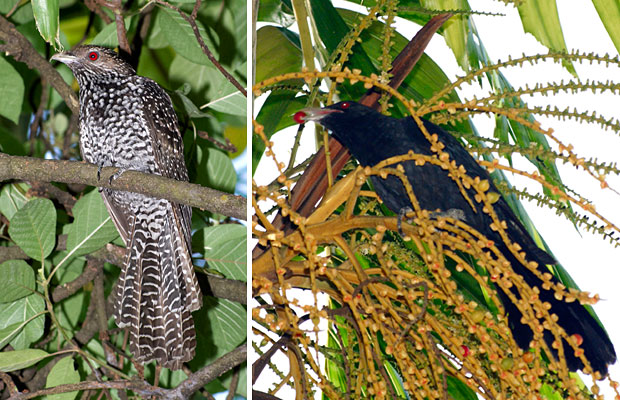Crows: Misunderstood in the Maldive
Islands
Bluepeace Special Report April 2004
Very few resident birds are recorded in the
Maldive Islands and the most common of them
are nearly two dozens of sea birds. Crow is
the one of most common terristrial resident
bird through out the Maldive Islands. There
are no known endemic species of birds in the
Maldives, but there are a few endemic subspecies
which includes the Maldivian House Crow Corvus
splendens maledivicus. Crows are believed to
be first introduced to the Maldive Islands by
anchient master mariners who sailed in the Indian
Ocean, and they were used for navigation purposes
to look for land masses.
|
Crows
were used for navigation purposes to look
for land masses. |
Crows are classified in the phylum Chordata,
subphylum Vertebrata, class Aves, order Passeriformes,
family Corvidae, along with over 200 other species.
They are some of the most best known of all
birds. They are intelligent, wary and adapt
well to human activity. Some locals do care
and admire crows in the Maldive Islands, but
majority see crows as pests, ready to be shot
for fun.
Sadly, natives of these islands cannot perceive
crow as a bird and locally call it kaalhu and
never call it dhooni or bird. Dhooni is also
often call to child or girlfreind as a pet name
as a gesture of love and affection. However,
Kalhu is used in a negative way to refer someone
who is roudy, especially girls. So, in order
to address the issue of conservation of crows
in the Maldive Islands, the common perception
towards crows need to be changed.
Crows are an essential part of the food chain
of the islands of Maldives, their foods include
fish waste, worms, harmful insects such as tent
caterpillars, locusts and white grubs, in cleaning
up dead birds and animals, and even our improperly
disposed organic garbage. Crows are also scaveger
and they eat dead carcasses of fish and birds.
As crows play a vital role in the food chain
of the of the fragile island ecosystems of the
Maldive Islands and if there numbers are dwinddling,
this could have negative impact ecological balance
of these islands.
 |
Photo left: Din Din Koveli or Dhikoe-Female. Photo right: Kaalhu Koveli or Kuboali-Female.
photo by: John Michael |
Immediate threats to crows in the Maldive Islands
come from eradication of crows from selected
islands. On several islands the organic litter
is burned and thus lost to the island ecosystem.
A general change in the lifestyles of the islanders
towards more modern practices has brought with
it serious conservation concerns. For example,
natural vegetation is often cleared to make
the islands look” more develop”
with no crows. On the island of Fua Mulah it
was believed that the total eradication of the
crow was linked to the appearance of an even
more serious and damaging pest problem--the
longhorn beetle, which attacked the island's
breadfruit trees. An estimated 70% of breadfruit
trees, an important seasonal staple, had already
died (Hunter, 1994). The islanders believed
the eradication of the crow had removed this
form of natural pest control, and resulted in
the destruction of their breadfruit trees.
|
Local
population should learn to
appriciate
crows |
It is well known fact that crow incubates and
hatches the eggs of Asian Koel Eudynamys scolopacel.
However, total eredication of the crows from
selected islands still continues in the Maldive
Islands. Eradication of crows have a direct impact on the Asian Koel population in some islands, and Koel stock have declined due to the fact that most Koel deserts their eggs onto crow nest where they are hatched and looked after by the unknowing crow. Ironically Asian Koel is a protected bird
in the Maldive Islands under Environmental Protection
and Preservation Act and crows are not. Laws
and regulations designed to protect birds in
the Maldive Islands are well intentioned but
rarely enforced.
In many islands crows have learned to prosper
very well alongside humans. They have adapted
to urban environment and learned how to benefit
from human activity. However, in some islands
in the Maldives, sadly crow population have
started to dwindle and others totally wiped
out. As a result of total eradication of crows
in some islands, Asian Koel population has started
to dwindle through out the Archipelago. The
usual early morning songs of crows and Asian
koels fascinate many in the morning, but, the
fear is….. for how long?
References
Hunter, D. (1994) A report on a trip to Fua
Mulah to assess the problem of Batocera rufomaculata
on Artcarpus altilis. Report prepared for Ministry
of Fisheries and Agriculture, Republic of Maldives
Hunter, D. (1996) Traditional pest control and
agricultural development in the atolls of the
Maldives
|